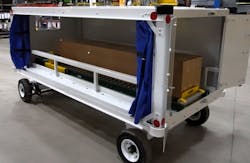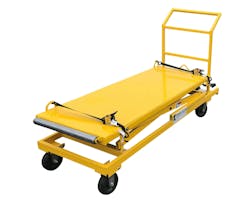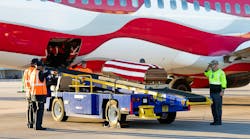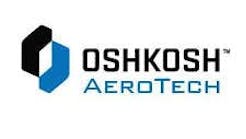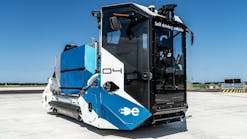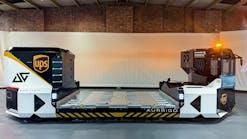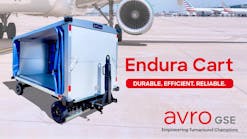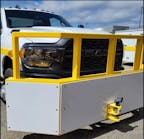This article is part of Ground Support Worldwide’s “Handling with Compassion” series, which looks at the respectful transportation of human remains, including military human remains.
Par-Kan Company, a steel fabricating company based in Indiana, makes ground support equipment (GSE) specifically for the respectful transport of human remains.
Human Remains Cart HR5010 was designed for military human remains, while Human Remains Dolly HRD 1000 is used primarily for civilians.
“Par-Kan Company takes pride in making these carts and dollies. We want our veterans and people’s loved ones to be brought back to their final resting place with ease,” say Par-Kan representatives Lu Vick and Vanessa Yentes, pointing out that several of their colleagues are veterans.
The HR5010 is primarily made of 12-gauge steel protected by a tough powdercoat finish. According to the Par-Kan representatives, 12-gauge steel was selected for its durability and its impact on the unit’s overall weight.
One side of the cart is a durable curtain that opens in the middle so the cart contents can be easily accessed for adjustments or so the contents can be verified during transport.
The curtain is available in multiple colors and can be decorated with an American flag. The roof of the cart, however, is always white so that the cart is easily identifiable, but decals that represent the various military branches and the words “To Honor All Those Who Have Served” are optional.
The standard design of the human remains cart is 10 feet long and 5 feet wide, about the size of a baggage cart, but 10 inches shorter. The original design was 8 feet long by 4 feet wide, but the standard design works for various lengths of caskets. To secure cargo of different lengths, the cart has adjustable roller stops that lock in place, and the curtain side of the cart has a metal rail.
Par-Kan, responding to a request by Southwest Airlines, introduced its human remains cart in 2016.
“This was made to transport specifically Service members that have given their lives in service of our country overseas and are being transported back to the States for burial. The design is to make handling caskets simpler,” says Vick.
Specifically, the doors at the back of the cart open and rollers make transfer to and from an aircraft easier.
According to Par-Kan representatives, customers today who have Par-Kan human remains carts include Southwest Airlines and Delta Air Lines.
Features of the HR5010 include fifth wheel steering, which provides full 360-degree rotation and maneuverability in tight spaces, and an ergonomic torsion relief tow bar. When released, the tow bar will not hit the ground, which can create a distracting clang, and the operator does not have to bend down to lift the tow bar. When lowering the tow bar, the patent-pending tow bar-activated braking system applies the brake.
“It’s all one clean motion so the brake will release,” says Vick.
Human Remains Dolly
Human Remains Dolly HRD 1000, also available since 2016, is used to transport caskets from the aircraft to a waiting vehicle.
“The HR dolly cart is one standard design, as well, to be cost effective, easy to operate,” says Vick.
The dolly is made of heavy gauge steel, protected by a powdercoat finish and available in multiple colors. Dolly length is nearly 6 feet and the width is a little over 2 feet. The height, 1.5 feet to 4 feet, can be adjusted using a pedal to manually raise and lower the platform, which is kept in place with locking caster wheels. To help keep the cargo in place and from moving while in transport or during the raising or lowering process, the dolly has ratchet straps.
Both the dolly and cart have a steel identification tag for inventory asset tracking.
